“Security is a thick signifier”
“Like health and status, security is a condition that is not difficult to define; in each case, the starting point should begin in the experiences, imaginings, analyses and fears of those living with insecurity, ill-health or low status”
The two quotations opening this piece are considered two of the most striking responses to one of the thorniest questions that greeted the post Cold War. It was the question of what do we actually mean when we talk about anything at all, be it the State, Sovereignty, the Constitution, Nation, Class, Development, Security, Government and so on. The word security happened to pose the trickiest then and hence the two selected responses above for what they signify.
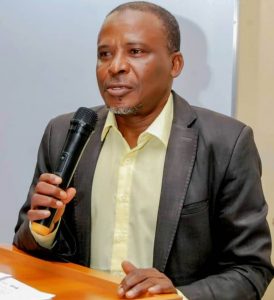
Mallam Y Z Ya’u: a debate in when a revolution is revolutionary?
The quotations came to mind when Mallam Y Z Ya’u, the Executive Director of the Centre for Information Technology and Development, (CITAD) posted a piece detailing what he and CITAD had done to facilitate a primary school for the Shara Community in Sumaila Local Government Area of Kano State. Going by the two quotations, his article turns up to tell a story of a great case of bursting a site of structural violence in modern Nigeria, of making an unheard scream to be heard and, therefore, a classic of what is now known as Emancipatory Realism or the Welsh School in critical security studies.
But Emancipatory Realism is neither class nor ideology as such. According to its ideologues such as Ken Booth and whose the second of the above quotation is would say that Emancipation is the project of creating conditions for what it might be to be a human being as opposed to merely being human. And he would go on to add that Emancipation is the philosophy, theory and politics of inventing humanity. These are all exactly his own words for those who might have encountered him, especially in the thick text, Theory of World Security. It is critical theory applied to critical security studies.
What is emphasised is not class but agency and reflexivity. So, Booth would say that people like the late Anwar Sadat of Egypt, Mikhail Gorbachev or Nelson Mandela demonstrated the power of agency. So, he traces fatal flaws to what he calls allowing one’s self to be programmed as a prisoner of fate as opposed to choosing to be an autonomous actor, exactly his words. Here, he clashes with Marx directly by suggesting that individuals can re-write history as a discretionary exercise. His reference to Gorbachev above strengthens the argument that the collapse of the USSR came as a choice by the Politburo to free the country from being the burden bearer of global socialism and re-position the country differently. There are too many pronouncements by Gorbachev along the line that supports that argument just as the dynamics of the last few months of USSR equally support the Boris Yelstin factor in the explanation of the implosion of USSR – his memories of bitter family experience of the Communist Party and his articulation of Russian nationalism. But, if the CPSU had decided to free the country of any such burden, why the hopelessly bungled August 1991 coup from which neither Gorbachev nor the USSR ever recovered? And why did Putin describe it as the greatest catastrophe of the 20th century? Of course, Putin was not high up at the time to have known what the men in the dachas might have decided, being merely a security operative who was not even inside the country then. Questions, questions and questions!
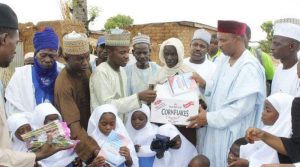
Pupils receive study materials provided by CITAD in a Dec 2016 picture
Anyway, Emancipation does not subscribe to structuralist reasoning such as classical Marxism. Beyond the egalitarian impulse, it does not share a binary framework of workers versus bourgeoisie. It is more about freeing people from despotism, ignorance and inequality, another take from Booth. That makes it reasonable to suggest that Mallam Y Z Ya’u consciously or unconsciously borrowed heavily from Emancipation in bringing about freedom from ignorance and inequality for the people of Shara Community through the instrumentality of a primary school. It is freedom or emancipation because a primary school in such a community is the first condition for what it might be to be a human being as opposed to merely being human.
Does the fact that neither class nor ideology is the foregrounding push in the campaign make this any less a revolution, going by the logic of the second quotation above? When might a revolution be revolutionary today? When there is a workers’ putsch or when national liberation warriors march into town? Is it when anti-globalisation/Occupy Movement commanders chase away IMF/World Bank technocrats and leaders of G-7 from one resort or another? Or, is it the much debated Military Vanguardism, Arab Spring or the Indigeneity Movement in Bolivia, January 2012 in Nigeria or when a Sowore gathers some urban agitators in Lagos or when a Ya’u takes education to the middle of nowhere in 21st century Northern Nigeria?
How great would it have been if there something of a thinking camp posing and reflecting on questions of this nature. Sadly, nobody is sure there is. Too bad!
Like the author of the piece below, Intervention is also breaking the rule of not re-publishing what is already available to the majority in other outlets at no extra cost. It is not to give wider publicity to the article but to let the author speak in his own words. And so, here we go:
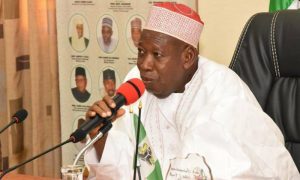
Gov Umar Ganduje of Kano State
Ganduje, Free Education and Shara Community
Today I am, once again, breaking my rule of not writing on Facebook. I cannot help it. As I read the speech of Governor Umar Ganduje of Kano State to the opening of the State’s Summit on Free Education this morning, it was easy to for me to imagine the elders of Shara Community of Sumaila Local Government of the state smiling. Often, we mistake the smiles on the faces of people as indicating happiness and if you see the elders in Shara smiling after hearing the news of the promises by the governor, you may jump into this wrong conclusion. The reality is that, often, people find a way to express their disappointment through harmless smile which provides a therapeutic effect of not allowing their blood pressure to rise because of the disappointment.
Shara people have everything to be disappointed and to listen with unbelieving ears to whatever government officials tell or promise them. For many years, they have seen politicians who had gone there to campaign, offering them Madina in this rusty enclave but failing to deliver anything after winning the elections.
Shara, with a population of over 3000 people (and contributes about 600 of the out of school children in the state) does not have a primary school and it is not that they do not like education. They are yet to get a graduate of secondary school. The nearest primary school is at Matigwai, a few kilometers away, but midway, there is a river. So, when it is raining season, the river is full and because there is no bridge across the river, the small children cannot cross and so stop going to school. This is how they end up never completing primary school.
Each election round, they would be promised a bridge over the river, a road and a primary school, promises which till this moment, have not been redeemed.
In 2017, upon community consultations and mobilization coordinated by CITAD, members of the community decided to set up a primary school by themselves. They offered their farms as free land for the school but they had no money to erect the school structures. But luckily, a new mosque had been built in the community and they decided to convert the old mosque to the temporary site for the school and got some volunteer teachers to run the school. On the first round of enrollment, over 300 children (girls and boys) were registered in the school.
Deploying a tick of advocacy creativity, CITAD decided to sew uniforms for these pupils and also provide exercise books and writing materials and decided to organize a public presentation of these during what was formally tagged as the public presentation of the school. We invited the State Ministry of Education (that time, my good friend and former colleague at Bayero University, Kano, Prof. Hafizu Abubakar was Commissioner for Education), SUBEB, the Local Government Education Authority, political figures in Sumaila Local Government.
They honored the invitation and dared to be with us in the village. During the ceremony, the Local Education Authority Secretary promised to ensure that school furniture was provided to the school (because at this point, the school had no desks or chairs as the pupils sat on the floor to take lessons). The Ministry of Education promised to start building at the site donated while SUBEB promised teachers.
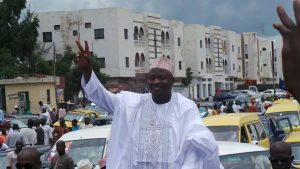
Is Honourable another case of promises of deliverance without deliverance of promises?
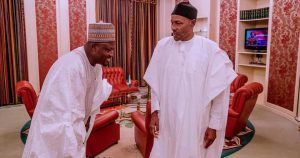
Legislator and president: anything for a forgotten community?
Today, it is almost three years and the community has persevered in running the school by themselves without any assistance from Government or political figures. Many of these people have moved on. Governor Ganduje is into his second term. We did a couple of media campaigns, directly engaged with political leaders in the area, including Hon Kawu Sumaila who now wants to build a university in a local government where a major community does not have a single classroom of primary school. All these fell on deaf ears and till now, all the promises made to the school or community have not been redeemed. There are no teachers in the school, no furniture in the school and no building has been erected.
On September 10th, 2019, we will again go back to the community, with new set of uniforms, writing materials and Exercise books and this is why I am ambivalent about what Governor Ganduje has promised to Kano State. There would be free education, many new teachers would be employed. Many new classrooms would be built and school infrastructure expanded. Will Shara Community benefit from the loin heart of Ganduje?
You can see why their rueful smile tells the story of stoic elders whose knowledge of the folly of politicians cannot be captured by our professors of political science. As we prepare for that eventual date, I urge Governor Ganduje not to just sit cozily in Africa House or hold to a booming microphone in Coronation Hall. Let him follow us to Shara and let him tell them what this new education means to them. Will he immediately order the building of the schools? Will he direct SUBEB to post teachers to the school? Will he ask the local Government Chairman provide the much-needed school desk and chairs, many of which I see wasting in various places in the state?
They will not be waiting for any “bill and other necessary legislative instruments” that governor said his government was articulating. All these simple demands do not require any law. Let Ganduje demonstrate that he is serious about this new found zeal for Free Education by acting it out at Shara and then we will clap for him and the smiles on the faces of the elders of Shara community can be taken for one of satisfaction, happiness and expression of admiration and in lieu of gratitude.




























